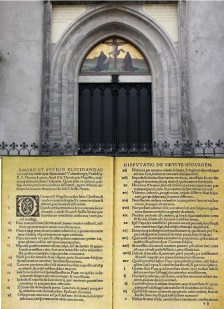Regardless of whatever you believe or whether you believe in anything at all, I see ‘coming out’ as a religious experience. To understand this, let me give you a framework of what I mean by religion. But first, I’ll explain what religion is not.
-

In a purely post-Protestant fashion, religion is neither the top picture nor the bottom picture
Religion is not church, synagogue, mosque, gathering place, or any other space or
institution. That “I” word is very important when understanding religion.
- Religion is also not the set beliefs, tenets, ethics, rules, or any other ideologies. That other “I” word is also very important for understanding religion.
Religion—as a discourse, conversation, dialogue, or ideation—is a way we talk about things that we paradoxically consider to be of ultimate concern to us while also being beyond ourselves.
By ultimate concern, I mean that which is of the most importance to us. It is the thing that we consider to make sense of, account for, hold together, ground everything.
By beyond, I mean it as a metaphor. Religion is metaphor. It is a whole discourse situation of metaphors used to help us express that which is of ultimate concern.
In fact, faith, this thing of trust in something, is a metaphor of ultimate concern.
Think about what is most important to you. Then think about what is more important to that. Then think about what is most important to that. Keep going back and there you have your ultimate.
So, what’s your ultimate? Here’s an example of this working out. Let’s say right off the cuff that ‘family’ is the most important thing to you, whether or not you believe in a God that is responsible for it all.
 Why is your family important?
Why is your family important?
You may say it’s because it’s important for people to be together. Why is being together important? Well…
You may say it’s because security is important.
Or maybe you say it’s because a sense of belonging is important.
And this is important because…
You have a fear of dying.
Or of being alone.
And this is important because…
You recognize that mortality exists
or because you value the principle of love.
And this is important because…
You assume that life exists
Or you assume everyone feels and needs love.
And probably, at this point, you have reached an inexpressible ultimate for why it is important that existence is and that being loved is. You still following along?
But if you think about this hierarchy of ultimacies, at some point you will have expressed necessary needs, unbearable situations to avoid, and virtues to be exemplified.
And before you get to the end, you will usually make the claim that either everyone must feel or think this way or at least under some conditions people feel and think this way.
Now, if you’re still following along, I want you to think of theology as the conversation that makes sense of these ultimate concerns, and that religion structures them in such a way that they meet people’s necessary needs, prevent unbearable situations, and exemplify virtues as best as they can.
But how religions and some philosophies work sometimes is that they cut out the middle people, saying that what is of utmost importance to you is that there is or isn’t a reason for things to be important.
That brings us to talking about faith in the coming out experience.
Like I said earlier, I believe that the coming out experience is a religious experience. It is a moment (or series of moments) where we come to actualize a part of ourselves that we consider of utmost significance <<dare I say, ultimate>> to ourselves. So, you can understand why coming out can be difficult for LGBTQ persons who consider themselves people of faith: it’s a battle of ultimates!
The next few illustrate what happens in this battle royale, so stay tuned!









 Why is your family important?
Why is your family important? Founded in 1972 with the simple act of a mother publicly supporting her gay son, PFLAG is the nation’s largest family and ally organization. Uniting people who are lesbian, gay, bisexual, transgender, and queer (LGBTQ) with families, friends, and allies, PFLAG is committed to advancing equality and full societal affirmation of LGBTQ people through its threefold mission of support, education, and advocacy.
Founded in 1972 with the simple act of a mother publicly supporting her gay son, PFLAG is the nation’s largest family and ally organization. Uniting people who are lesbian, gay, bisexual, transgender, and queer (LGBTQ) with families, friends, and allies, PFLAG is committed to advancing equality and full societal affirmation of LGBTQ people through its threefold mission of support, education, and advocacy.